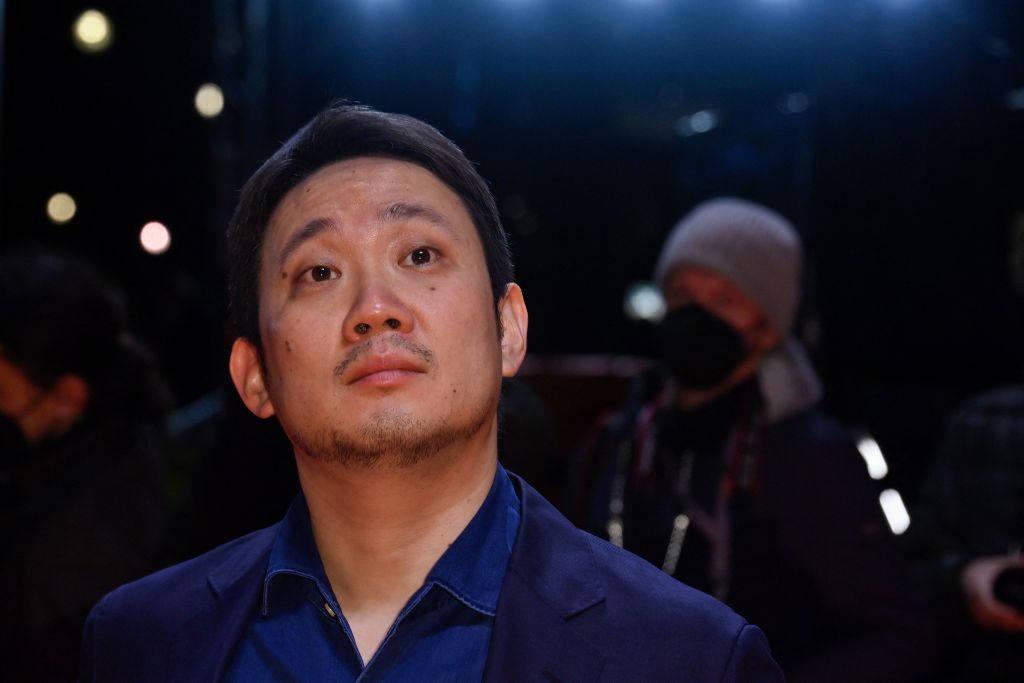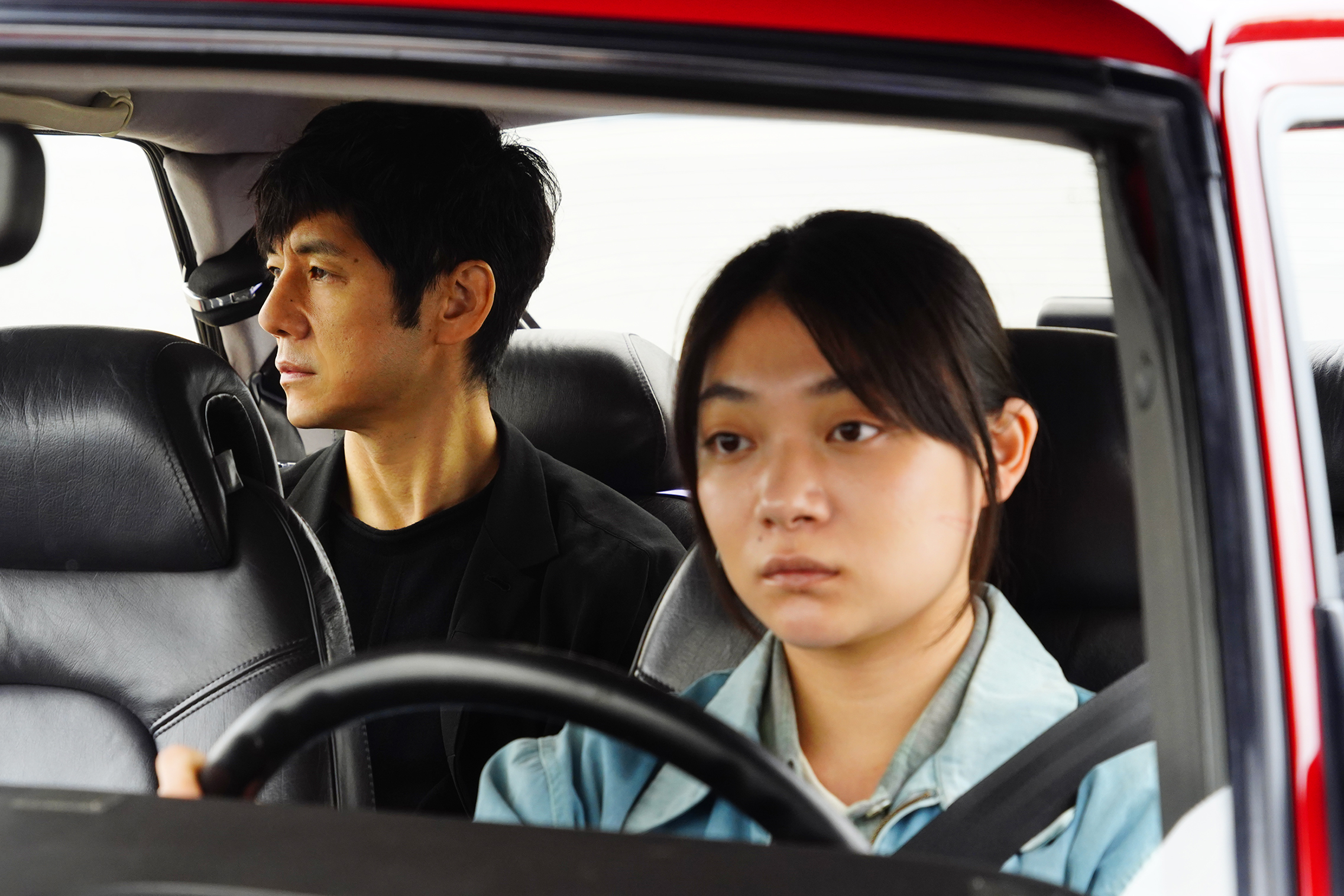
While the 2022 Oscar nominations were being announced, Japanese filmmaker Ryûsuke Hamaguchi was on a flight to Germany to serve as part of this year’s competition jury at the Berlin International Film Festival. “When I landed, I had dozens of messages on my phone. I knew something must have happened,” he tells TIME. That something was four major Academy Award nominations for Drive My Car, Hamaguchi’s aching and immersive rumination on love, grief, and the means in which life and art traverse as loss morphs into acceptance. He was in a shock when he realized his three-hour slow-burn—loosely adapted from a Haruki Murakami short story by Hamaguchi and Takamasa Oe—received nods not only in the anticipated Best International Feature category, but in the Picture, Director, and Adapted Screenplay categories as well. “My emotions couldn’t catch up with reality.”
It’s a fitting description for Hamaguchi, given how his characters in Drive My Car process their respective realities in a similar fashion—reconciling the present with their complex, evolving emotions. The story follows the distinguished theater director Yusuke Kafuku (Hidetoshi Nishijima), who stages an unusual production of Uncle Vanya two years after the sudden passing of his enigmatic wife. As the rehearsals progress, Kafuku forms close bonds with his quietly observant driver Misaki (Toko Miura) as well as Koshi Takatsuki (Masaki Okada), a young star who might have had an affair with his wife. As the mysteries of Drive My Car placidly trickle in, Anton Chekhov’s masterwork interconnects with Hamaguchi’s in revealing ways.
We talked with Hamaguchi about preserving mystery while adapting Murakami, crafting dialogue that prioritizes listening, and his thoughts on infidelity.
Driving with someone is a uniquely intimate experience. Being trapped in a moving box enables a certain level of trust and honesty between people. Was this a way in to the story for you?
The physical closeness of the two characters was definitely an important aspect. What we changed from the original source material is that we did not have it be a convertible car. I felt a closed environment, like you mentioned, [would] bring out some intimacy. Relationships are revealed through that physical closeness. What [mental] state they are in gets revealed as well. For instance, [Kafuku] was mentally quite far from [his wife Oto]. [But] he and Misaki were actually mentally quite close, which becomes apparent through their [physical proximity]. [At first], they were closed off to each other, but through that close physical [association], it was gradually revealed that they were close to each other.
Even though you obviously expanded and made quite a number of changes to it, you were able to preserve the short story’s aura of mystery. How did you and your co-writer approach the adaptation in that regard?
We read the original short story many times and knew that [it] couldn’t simply be adapted into a film. That’s something you can say about most Murakami novels. So when we went into changing things, rather than thinking heavily about how to do it, we just made sure that we were reading the original short story over and over. It became part of us and naturally [came] through in our writing.
Read More: Japan’s Oscar Entry Drive My Car Is a Gorgeous Tale of Loss and Forgiveness
Preservation of the mysteries was something that we really valued. For instance, [did] Takatsuki, the young actor, actually sleep with [Kafuku’s] wife? In the story, it’s not completely clear. I think in the movie it feels almost a hundred percent clear, but not quite. There was no easy solution [to our adaptation]. What we did was [bring in] the worldview of other Murakami stories and add aspects that we felt fit the full Drive My Car story. As the movie progressed, we [treated] it as something that was happening in present time, evolving as it went forward. That way, the elements of the original story that were already a part of my body at this point could come through when we hit a roadblock.
Furthering the point about mystery: there is something enigmatic that is integral to the way you craft dialogue, not just in Drive My Car but your other films, too. The exchanges between characters often feel like an immersive journey with an unknown destination.
The structure of my stories are defined when I’m writing. I know that the characters need to go in a certain direction, but as I write, I come to understand and get to know my characters more. Sometimes they surprise me. It’s almost like I’m listening in on someone else’s conversation. I don’t know exactly where it’s going to take me. I know that I can’t force lines to push the story. That can result in lines that are far from the honest emotion of the character.
I’m glad you mentioned listening, something I also wanted to bring up: your dialogues emphasize the importance of the art of listening. Your characters are palpably tuned into each other.
I need my characters to have that deep listening because I like that in real life as well. That’s why the main characters are such good listeners. They really experience other people’s lines. And without that comfort of being listened to, [you’re] vulnerable. It’s also hard for the actors to portray these characters without that. So really, listening is the most important part of the acting process that creates this domino effect of interaction.

I love that you used a variety of languages in the staging of Uncle Vanya. Because of the universal language of art, the difference between the spoken languages didn’t matter as much. How did you reach this choice and also decide that sign language belonged in the mix?
We’ve been speaking about listening. I think our listening really [focuses on] comprehending the voice, but [things also] get communicated through our body language. The mental state of a person [can be] very apparent in how they express themselves physically. In daily life, that’s something that we can all absorb from each other. In acting, once [the actors] knew the lines that they memorized, it was like their voice was communicating more than the actual words that were being spoken. So by using all of these different languages, it was almost like I was letting [the meaning] be expressed through the body more. I felt that the sign language was another step in that direction. It’s a more direct form of communication in terms of body movement and expression. And it’s a beautiful medium of communication.
In the film, part of the Uncle Vanya rehearsal process is sitting around a table and reading through the work without emotions. It sounds like you also rehearse with your actors in this manner. I’m wondering what this process enables.
To tie it to the listening aspect that we’ve been speaking about: within the voice and the body language, there’s all this information that’s being communicated. When you practice [repetitively] without emotion, it establishes this baseline where the words are simply understood. And [because] you have heard them so many times, you know what your partner in a scene is going to say in every moment. So you’re able to just act while feeling what your body actually feels. What happens then is that subtle emotions and changes in emotions become observable to the actors because they’ve seen it without any emotion at all.
Read More: Where to Watch or Stream All the 2022 Oscar Nominees
Acting is lying in the end. The reason that it seems like there’s a lot of subtle acting in this film is a part of this. Meaning, if the actors were to act in a way that’s not real, not true to their being and body, then their partners and other people on set will see that. If an action is too strong emotionally, they’ll know. So it’s really about creating a baseline of honest communication between the actors, this heightened listening, which I think is very difficult in improv. But in a sense, what they’re doing is like emotional improv [because] they’ve [already] memorized the lines so well.
You staged Sonya’s end monologue beautifully in Uncle Vanya, by placing her behind Vanya. All her movements felt so fluid and natural. I also loved the juxtaposition of a powerful moment being delivered through silent sign language, which made it all the more memorable.
Little by little, these aspects revealed themselves to me. We decided who [in Uncle Vanya] would communicate in sign language. So I didn’t really think about [the juxtaposition] as an idea. It was a necessary conclusion. [For staging], it made the most sense to have her behind him to have the audience experience this moment best, to see everything [in the sign language] clearly. I was worried that Kafuku maybe might not feel the emotion quite as directly, but when I talked to Nishijima, he said that it was actually extremely effective to have the hands so close, signing things right in front of his face. And then at times, she actually used his body as part of the signing process. That brought this physical alertness that helped his acting come alive. So it was very effective.
Unknowability of humans was a big takeaway for me, both from the movie and the short story. And I loved Misaki’s accepting way of looking at it. When Kafuku referred to his late wife’s hidden darkness as his blind spot, she suggested that he accept her as completely authentic and truthful, even when she sought other men. It’s a radical way of looking at identity, marriage and infidelity.
No one can know all of someone, which is just a normal part of our psychology. We still want to know, and sometimes we feel we do know. We basically stack [our] experiences with someone to get to know [them]. In terms of that unknowability: we learn how much we can’t know only through getting to know someone little by little. And I think the characters in this film did that. For instance, Takatsuki’s story actually brings about more mystery when he tells [it]. We can’t know exactly what happened, but through [absorbing] little by little what everybody shares, we get to know a little bit more. We dig into these [different] parts of people. In the end, we have to accept who they are, [who they] fully embodied, whether they are alive or not.
In terms of the word infidelity, I don’t really think about relationships that way. I think that the world is full of very attractive people and we become attracted to all sorts of people. It’s up to the individual to decide how far to take a connection with someone. I think that it’s impossible to define a relationship, which is a very important aspect that I tried to portray in this film.
This Q&A was simultaneously translated by Hamaguchi’s interpreter.
More Must-Reads from TIME
- Donald Trump Is TIME's 2024 Person of the Year
- Why We Chose Trump as Person of the Year
- Is Intermittent Fasting Good or Bad for You?
- The 100 Must-Read Books of 2024
- The 20 Best Christmas TV Episodes
- Column: If Optimism Feels Ridiculous Now, Try Hope
- The Future of Climate Action Is Trade Policy
- Merle Bombardieri Is Helping People Make the Baby Decision
Contact us at letters@time.com